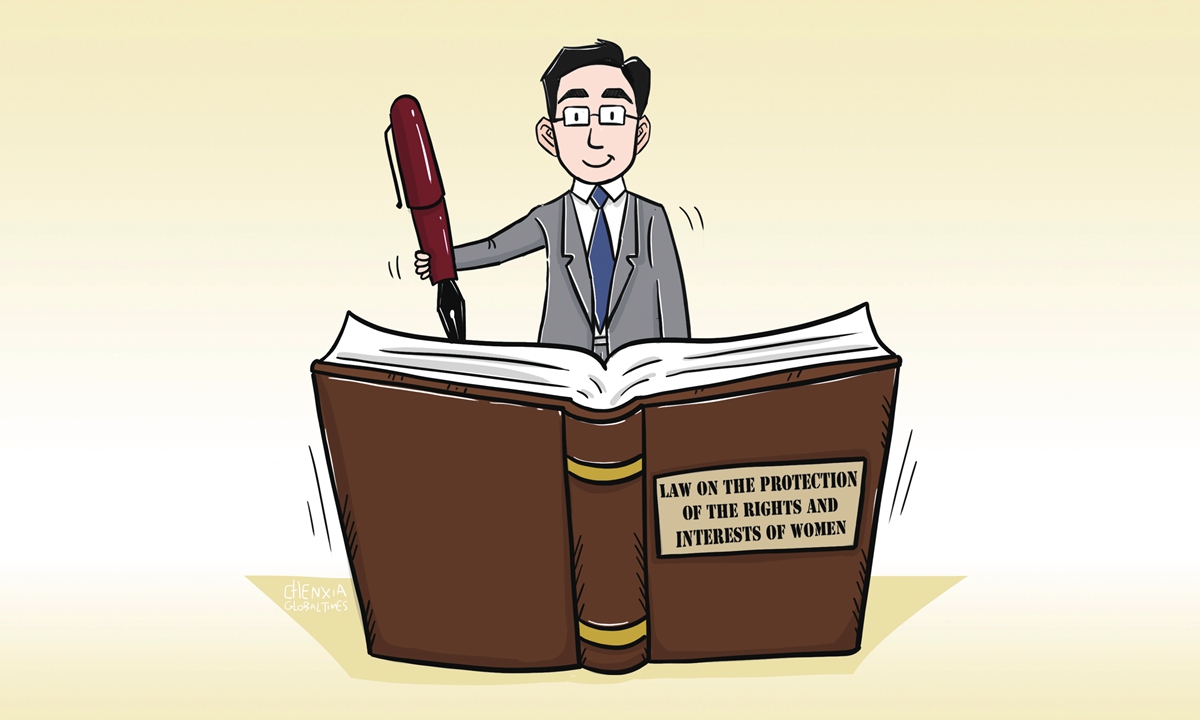Top-level push, not Western-style reactionary acts, will advance women’s rights in China

Illustration: Chen Xia/GT
The draft amendment of the Law on the Protection of the Rights and Interests of Women was submitted to the Standing Committee of the National People's Congress for deliberation on Monday. The law will define the specific meaning of "discrimination against women" for the first time and also define specific forms of sexual harassment against women.However, when Reuters and some other Western media outlets reported the news, they made great efforts to "prove" that Chinese women maintain a low status in the country.
What the media outlets have failed to report is that Western countries that criticize China have serious problems of gender inequality and sexual harassment of their own. If we learn from Western countries and let NGOs deal with gender equality, the result won't be ideal. NGOs are not professional investigative institutions, and they may facilitate a "court of public opinion" and cyberbullying, both of which will foster "gangster" behavior.
Under such circumstances, there is only one way to truly improve women's rights: Multi-party participation under the leadership of the government. When it comes to the protection of people's rights and interests, there must be concrete laws to prevent the situation from going to the extreme. Therefore, the only correct path is turning to top-level initiative, as well as legal and institutional guarantees.
After decades of development, China now needs a national strategy for advancing gender equality. It should be based on the country's overall consideration and build a good environment in terms of norms, concepts and specific strategies for protecting women's rights. Can all these be done simply by shouting slogans, like what is seen in some Western countries? Obviously and definitely not. Foreign media outlets such as Reuters have been condescending and showing off their sense of superiority.
One-third of the employees in Australia's federal parliament have reportedly been sexually harassed, and women's status in India is infamously low. Some people in the West and some so-called democracies have absolutely no consciousness of gender equality. The US has its "#MeToo movement," but in fact, the movement is a political tool used to take advantage of sexual harassment problems and gender issues. Objectively, the #MeToo movement cannot reach its goal and Hollywood is a hard hit area by sexual harassment. While in China, the so-called #MeToo campaign was made use of, from the very beginning, by external forces as a tool to oppose the Chinese system. Under the guise of protecting women's rights, the movement aimed to subvert the Chinese government. Whenever the Chinese government adopts measures to protect women's rights, the forces behind the #MeToo movement tend to attribute it to themselves.
The direction of China's future efforts is to promote a gender-friendly national strategy and build a systematic environment to provide a top-level initiative for resolving gender issues in our modern society. Unlike ineffective gender equality banner waving, China's strategies are realistic. The West has tried to monopolize the definition of "gender equality" and turn it into a tool for seeking political resources. That will not help to truly resolve the problem of gender inequality, but only make the results worse.
If China, like some countries, indulges radical civil feminist campaigns, letting them develop like wildfire, allowing them to protest in front of offices and wave banners, the result won't be beneficial for women. If China's relevant public opinion ends up like those in South Korea and Japan, where the economic system generally oppresses women, the puzzle will be even harder to resolve.
Fundamentally, gender equality is a social revolution that must be advanced in an orderly manner under the leadership of the government. Countries like China are able to resolve such a problem, because it cannot be resolved in only one or two years, and it requires policy continuity. The draft amendment to the existing law is a principled start.
The author is a professor at the School of International Relations and Public Affairs of Fudan University. opinion@globaltimes.com.cn

